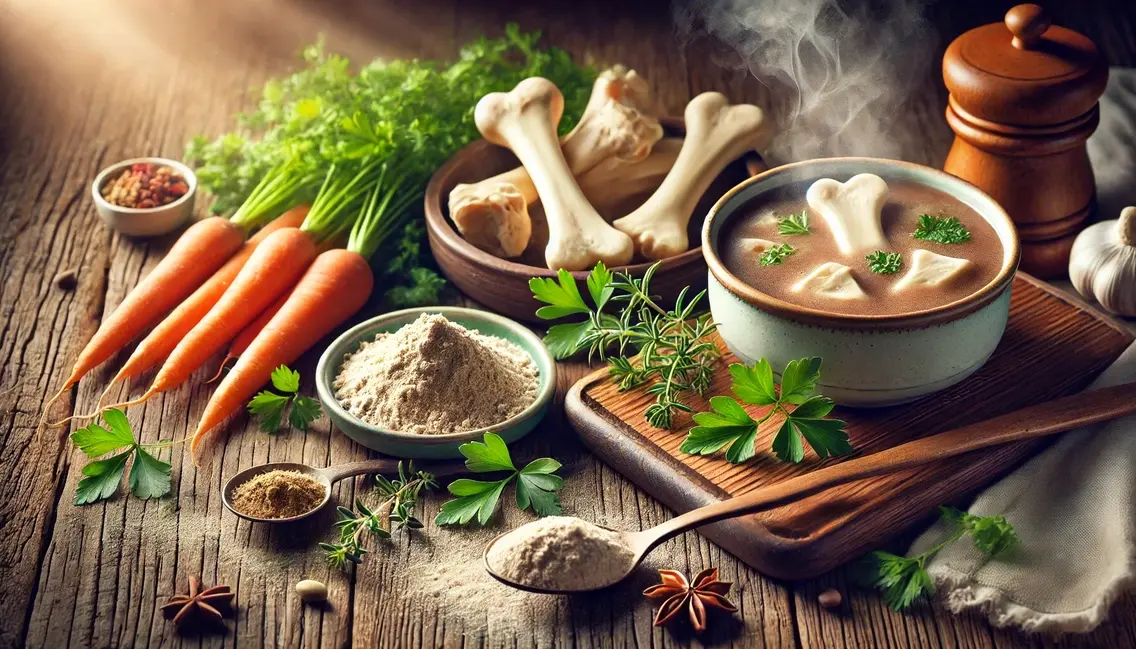The Surprising Secret to Health: The Bone Broth Protein Revolution
Ever wondered if there’s a missing link in your diet that could unlock superior joint protection, improved digestion, and effortless hydration—all in one cup? Enter the bone broth protein—a time-tested, nutrient-packed brew gaining newfound recognition in today’s health circles.
Historically cherished by grandmothers and chefs alike, bone broth is not just flavoring your soups—it's a scientific powerhouse packed with collagen, offering unique benefits that traditional protein sources overlook. Despite not being as high in protein content as your typical chicken breast or legume-rich salad, the collagen and gelatin in bone broth could be the missing ingredients for holistic health and rejuvenation.
Wondering if it's a suitable swap for your regular protein shake? While it shouldn't entirely replace your whey or soy supplements, bone broth can certainly enhance your diet when strategically integrated. Ready to explore how sipping bone broth could reshape your wellness routine? Let’s delve into the health benefits behind this secret elixir...
Health Benefits of Bone Broth Protein
Bone broth protein is a nutrient-dense fluid, offering distinct benefits thanks to its collagen and gelatin content. While it may not provide as much protein as some traditional sources, bone broth has unique advantages for your overall health and wellness.
Key Health Benefits
- Supports Joint Health
Collagen from bone broth plays a vital role in maintaining joint health. As a key component of cartilage, collagen helps cushion joints and minimize friction during movement. Regular consumption of bone broth can contribute to joint health, especially for those who enjoy physical activities.
- Aids Digestive Health
The gelatin in bone broth supports digestive health by maintaining the integrity of the gut lining. This benefit is particularly significant for individuals facing digestive issues, as it promotes general gut wellness.
- Provides Essential Minerals
Bone broth is rich in essential minerals like calcium, magnesium, and phosphorus, all crucial for bone strength and various metabolic processes. Regularly consuming bone broth enlivens your diet with these vital nutrients, fostering overall bodily functions.
- Hydrates and Replenishes Electrolytes
As a hydrating liquid, bone broth helps maintain fluid and electrolyte balance in the body. It is especially beneficial after intense workouts or during recovery from illness, enhancing hydration and recovery efficiently.
For those looking to incorporate these benefits into their daily routine, Nourish your body with LEANFIT Beef Bone Broth – 15g of grass-fed, hormone-free protein per serving, rich in collagen and easy to digest, provides a convenient and effective option.
Incorporating Bone Broth Protein for Optimal Health
Adding bone broth protein to your diet enriches it with a unique complement of health benefits that align with a balanced dietary plan. By incorporating bone broth, you benefit from its holistic nutritional profile, supporting diverse dimensions of your health. Let's delve into how you can seamlessly integrate bone broth into your meals for achieving optimal health results.
Dietary Sources of Bone Broth Protein
Explore the natural sources and benefits of bone broth protein. Although it may not be the most concentrated protein source, bone broth is valued for its collagen content, offering unique health advantages.
Natural Sources and Benefits of Bone Broth
- Collagen and Gelatin
Bone broth is rich in proteins from collagen and gelatin, extracted from animal bones through simmering. These proteins are known to support joint health and enhance skin elasticity, thanks to their collagen content.
- Amino Acids
Bone broth provides essential amino acids like proline, glycine, and glutamine, which are crucial for gut health and tissue repair. However, it should be combined with other protein sources for a complete amino acid profile.
Challenges of Obtaining Bone Broth Protein from Diet Alone
Sourcing adequate bone broth protein from diet alone presents challenges. While bone broth contains beneficial compounds, achieving the necessary daily intake of collagen can be difficult due to the low concentration of protein found in the broth itself. The preparation process, which involves simmering bones for an extended period, can be time-consuming and impractical for those with busy schedules.
To address these challenges, products like LEANFIT Beef Bone Broth offer a convenient solution. It provides 15g of grass-fed, hormone-free protein per serving, rich in collagen and easy to digest, making it an excellent option for those looking to effortlessly boost their collagen intake while maintaining a balanced diet.
Incorporating Bone Broth Protein
Although bone broth alone may not suffice as a primary protein source, integrating it into meals can augment the nutritional value with added collagen benefits. Whether enjoyed as a warm beverage or used as a base in soups, bone broth complements a diet geared toward comprehensive nutrition. Next, we will delve into daily protein intake recommendations and explore how bone broth can fit into general dietary guidelines.
Daily Intake for Bone Broth Protein
Bone broth protein is primarily composed of collagen and gelatin, making it beneficial for supporting joint health and improving digestion. While it provides many health benefits, it is not a significant source of protein when compared to traditional options like meat or legumes.
Recommended Daily Intake
There are, as yet, no specific guidelines for the daily intake of bone broth protein. On average, it offers about 6 to 10 grams of protein per cup. Thus, it is recommended as a complementary element in your diet rather than a primary protein source. Consistency in your nutritional habits is crucial, so integrating bone broth protein with various other complete proteins ensures that you meet your daily nutritional requirements.
Incorporating Bone Broth Protein into Your Diet
Including bone broth in your meal plan can be both hydrating and nutrient-rich. However, it's important to pair it with other complete protein sources to fully satisfy your body's dietary needs. For those keen on maximizing their protein variety, consider how Nourishing your body with LEANFIT Beef Bone Broth – 15g of grass-fed, hormone-free protein per serving, rich in collagen and easy to digest might fit naturally into your daily routine.
Making sure you sustain an optimal level of nutrients is key to avoiding deficiencies. Bone broth can be a superb addition to your nutritional repertoire, but balance remains essential.
Deficiency of Protein in Bone Broth
Bone broth has gained popularity for its potential health benefits. However, a common misconception is its role as a primary protein source. While rich in collagen, its overall protein content is modest when compared to other dietary options.
Deficiency Symptoms and Consequences
- Insufficient Muscle Maintenance
Relying predominantly on bone broth for protein may lead to suboptimal muscle repair and growth, as it lacks the array of essential amino acids necessary for optimal muscle health. The limited variety of proteins, mainly collagen, could leave your muscles undersupported.
- Potential For Increased Fatigue
Bone broth’s collagen-based protein lacks essential branched-chain amino acids, vital for energy production and muscle metabolism. Without these, you might experience unanticipated fatigue due to inadequate nutritional support.
- Reduced Overall Protein Intake
With only 6-10 grams of protein per cup, bone broth falls short of fulfilling daily protein needs, particularly for those with higher requirements. Without supplementing with other protein-rich sources, you risk encountering symptoms of protein deficiency, impacting your overall vitality and wellness.
Managing Protein Deficiency Through Diet
To counterbalance the nutritional gap when including bone broth in your diet, it's essential to pair it with protein-rich foods such as meats, legumes, or nuts. While bone broth carries unique benefits, like supporting digestion and potentially enhancing joint health, achieving a balanced intake of complete protein sources ensures better overall health outcomes.
For individuals concerned about deriving optimal nutrition from bone broth, consider augmenting your diet with easily digestible and protein-rich options, like Nourish your body with LEANFIT Beef Bone Broth – 15g of grass-fed, hormone-free protein per serving, rich in collagen and easy to digest! to safeguard against deficiency risks.
Ready to delve deeper? Let's address some common questions about the protein content and benefits of bone broth to enhance your understanding and dietary choices.
Conclusion
The bone broth protein revolution invites us to revisit a timeless ingredient with newfound appreciation. As you consider integrating bone broth into your fitness regimen, remember that its true strength lies not in replacing your primary protein sources, but in complementing and enriching your overall nutritional intake. By offering unique benefits such as supporting joint health, aiding digestion, and providing essential minerals, bone broth becomes an invaluable ally in your health arsenal.
So, here's a challenge for you: How will you reinvent your wellness routine with bone broth protein? Perhaps it's as simple as starting your day with a warm, comforting cup or using it as a replenishing post-workout drink. Whatever the method, remember that impactful transformations begin with thoughtful choices.
Are you ready to share your journey? Tag a friend who might benefit from this ancient elixir and start a conversation about how small dietary shifts can lead to significant wellness gains. The secret's out—bone broth protein is making a comeback, and it's up to you to decide how it fits into your quest for optimal health. Your body deserves nothing less!

